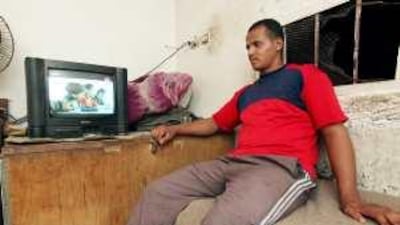CAIRO // Ramadan is traditionally a time when television serials and talk shows dominate the pop culture scene, as broadcasters take advantage of large, captive audiences who settle in for an evening of viewing pleasure after a day of fasting. But this year it is the advertisements between shows that are causing stir in Egypt.
Alongside the typical commercials and government warnings about swine flu, charities have been featured prominently, hoping to capitalise - cynically, some say - on the Ramadan spirit of giving, as have government advertisements, which critics say amount to responsibility- absolving propaganda putting the onus on citizens to rescue failing infrastructure and help alleviate poverty. "Ads on Egyptian screens are more interesting than TV series and programmes. Their messages are stronger and more influential," said the columnist Wael Abdel Fattah, who has written about the ads for the Egyptian opposition daily Al Destour and the Lebanese daily Al Akhbar.
A new campaign for the ministry of transport about the country's trains, which have become notorious in recent years for a series of deadly accidents, is one of the public service announcements that has garnered scrutiny. The ads draw attention to the vandalism of trains and remind Egyptians that billions of pounds of taxpayer's money have been recently spent on renovating them. The ad asks: "Do you think this ad will change a thing? Of course not. You are the only one capable of change, because the Egyptian who's right, will say no to wrong."
Critics say the ad is trying to pass the burden of maintaining public property on to the public. "This ad and the other ones encouraging people to pay their taxes are leading viewers to be 'good citizens', to deserve the state that has resorted lately to ads promoting itself," said Abdel Fattah. The man behind the trains campaign, as well as ads calling on Egyptians to pay their taxes, is Tarek Nour, an advertising guru since the 1970s and a member of the ruling National Democratic party, headed by the president, Hosni Mubarak.
Mr Nour launched his new TV channel, Al Qahira wal Nas, or Cairo and the People, at the beginning of Ramadan with the motto, "The most daring channel in Ramadan". Mr Nour has come under fire for his closeness to the government. Indeed, Al Qahira wal Nas was given to him by the ministry of information and his ads have since dominated state television. "Tarek Nour has become the spoiled adman of the NDP without knowing the difference between politics and tourism, and the government has rewarded him for his loyalty by granting him all the ads of its different ministries and gave him a channel during Ramadan, and he has the right to use those ads as he wishes," said an editorial in Al Fagr, an independent weekly.
Mr Nour dismissed the criticism as political point-scoring. "All those criticisms are coming from people who are critical of the government no matter what it does," said Mr Nour. "Such talk is mainly coming from envious competitors." Mr Nour denied the government was doing him any favours. "As if they are blaming the government for going to the best lawyer to present their case to the people," he said. "I have 19 companies, one of them for ads, and I'm the best in the ads business, and [am] helping the government in its campaigns. What's wrong with that?"
The pan Arab daily Al Quds Al Arabi said commercials in the Arab world generate US$100 million (Dh367m) in revenues during the holy month. Mr Nour's advertising agency is also in charge of a controversial ad campaign that is urging viewers to donate money to the needy. Critics say running ads celebrating government achievements such as train renovations, alongside those urging charity for the millions living in poverty - a result of government policy, they say - is hypocritical.
"We could have believed the expensive ads paid by the government about its achievements, if it weren't for the counter ads campaign that remind us that half of the Egyptian population is poor and is asking the kind Egyptians to help solve their problems away from the government," wrote Adel Hamouda, the editor of Al Fagr. Others said the money spent by charities on "lavish" advertising campaigns could have been better spent on charity itself.
The scriptwriter Wahid Hamed lamented that more than 35m Egyptian pounds (Dh23m) had been spent by eight charities and cancer hospitals on commercials asking for donations for the poor. "Who said it's OK to spend lavishly from already donated money on ads," Hamed wrote yesterday in the independent daily Al Shorouk. "Who allowed the humiliation of the poor and the sick, by showing their pictures and begging on their behalf."
There are ongoing TV and radio ad campaigns addressing mainly the poor, urging them to spend less in order to live better, which have also angered viewers. "This is a very provocative ad," said Safinaz Ahmed, a sales executive at a water treatment company. "I hate those ads as they are blaming the poor for their suffering, and asking them to spend less, without acknowledging that life has become expensive, and freeing the government of any responsibility."
Abdel Fattah, the columnist, said the government's Ramadan commercials were symptomatic of a deeper political malaise. "The problem with these ads is that the state decided to manage its relationship with the nation through ads, telling them that they are wrong and have to change their behaviour," he said. "The government, which is not saying it's doing anything wrong, is trying to promote its policies, not to improve or correct them."
nmagd@thenational.ae

